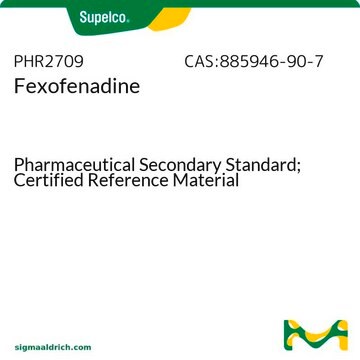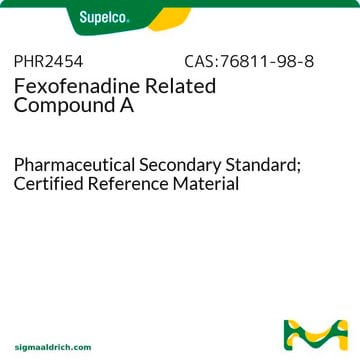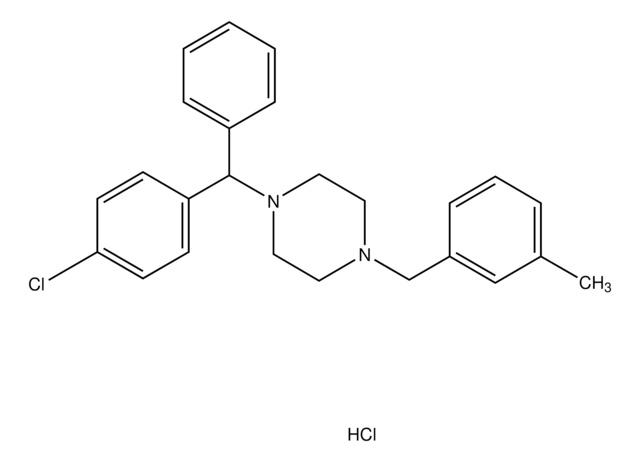F9427
Fexofenadine hydrochloride
>98% (HPLC)
Synonym(s):
Fexofenidine hydrochloride, MDL 16455 hydrochloride, Terfenidine carboxylate hydrochloride
About This Item
Recommended Products
Assay
>98% (HPLC)
form
powder
storage condition
desiccated
color
white to beige
solubility
DMSO: soluble ≥5 mg/mL
originator
Sanofi Aventis
storage temp.
−20°C
SMILES string
Cl[H].CC(C)(C(O)=O)c1ccc(cc1)C(O)CCCN2CCC(CC2)C(O)(c3ccccc3)c4ccccc4
InChI
1S/C32H39NO4.ClH/c1-31(2,30(35)36)25-17-15-24(16-18-25)29(34)14-9-21-33-22-19-28(20-23-33)32(37,26-10-5-3-6-11-26)27-12-7-4-8-13-27;/h3-8,10-13,15-18,28-29,34,37H,9,14,19-23H2,1-2H3,(H,35,36);1H
InChI key
RRJFVPUCXDGFJB-UHFFFAOYSA-N
Gene Information
human ... HRH1(3269)
Looking for similar products? Visit Product Comparison Guide
Application
Biochem/physiol Actions
Features and Benefits
related product
Storage Class Code
11 - Combustible Solids
WGK
WGK 3
Flash Point(F)
Not applicable
Flash Point(C)
Not applicable
Personal Protective Equipment
Certificates of Analysis (COA)
Search for Certificates of Analysis (COA) by entering the products Lot/Batch Number. Lot and Batch Numbers can be found on a product’s label following the words ‘Lot’ or ‘Batch’.
Already Own This Product?
Find documentation for the products that you have recently purchased in the Document Library.
Customers Also Viewed
Articles
Discover Bioactive Small Molecules for ADME/Tox
Discover Bioactive Small Molecules for ADME/Tox
Discover Bioactive Small Molecules for ADME/Tox
Discover Bioactive Small Molecules for ADME/Tox
Related Content
Explore protein pathway analysis through chemical library screening, investigating protein interactions, and modulating signaling pathways with small molecules.
Explore protein pathway analysis through chemical library screening, investigating protein interactions, and modulating signaling pathways with small molecules.
Explore protein pathway analysis through chemical library screening, investigating protein interactions, and modulating signaling pathways with small molecules.
Explore protein pathway analysis through chemical library screening, investigating protein interactions, and modulating signaling pathways with small molecules.
Our team of scientists has experience in all areas of research including Life Science, Material Science, Chemical Synthesis, Chromatography, Analytical and many others.
Contact Technical Service













